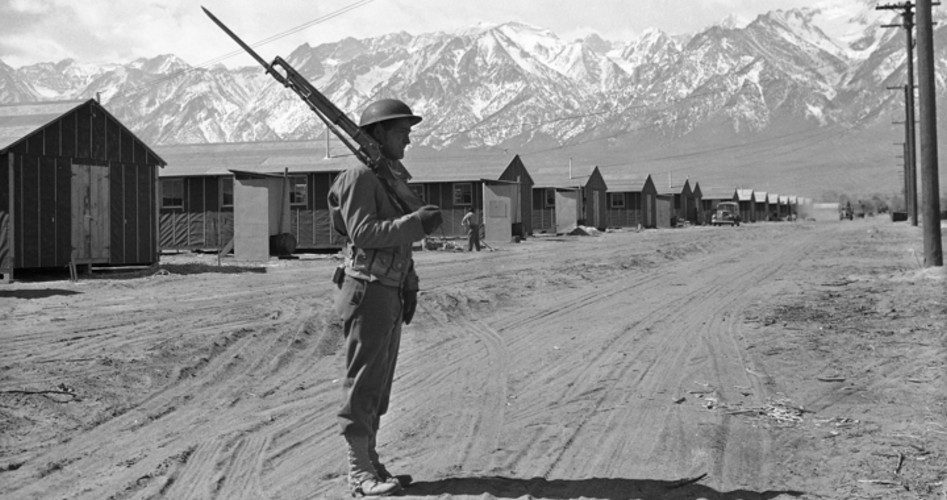
Anna Eleanor Roosevelt, the granddaughter of President Franklin Delano Roosevelt, referenced her father’s internment of 120,000 American residents of Japanese ancestry — 80,000 of them U.S. citizens — and declared President Donald Trump’s efforts to enforce U.S. immigration laws “worse,” and “inconsistent with who we are as a country.”
The 70-year-old Anna Roosevelt criticized the separation of illegal aliens from their children at the U.S.-Mexico border, and seemed to advocate for open borders. “We need people to fill the jobs that need to be done, whether in medicine, or construction or teaching.” She added, “We’re wasting our ability to build a stronger country.”
Setting aside the ridiculous assertion that there are multitudes of medical doctors and school teachers attempting to enter the U.S. illegally, Roosevelt’s claim that the Trump administration’s efforts to simply stop illegal entry into the country are “worse” than what her grandfather did during World War II is beyond amazing.
“With the Japanese internment camps,” Roosevelt said on Monday, “we gathered up the whole family and displaced them from their homes and their businesses and their possessions. This [Trump’s policy] is even worse.” Can this woman be serious? Preventing persons from entering the country illegally is worse than taking American citizens from their homes, ruining their businesses, and taking their property?
“We’re taking people from the only anchor they have when they’re in a moment of distress and separating them from that place where they feel like they have someone to hang on to. What I would have hoped is that we would have learned from the examination of internment during World War II,” Roosevelt added. So, does Anna Roosevelt really believe that it would be better to intern asylum seekers in mass camps for more than three years, as her grandfather did in 1942 with Executive Order 9066?
“Many wonderful people are looking to our democracy and saying, ‘That is the life we long for. That is the freedom that we hope for,” she continued. “They are human beings who are coming to this country because they’re terrified, because they’re facing extreme danger. They’re coming to our country because they think they can be safe. And if we assume they’re all criminals that’s just a backwards way of building a society.”
Roosevelt said that she wished President Trump would emulate her grandfather’s policies. “What I wish that [President Trump] would take from FDR is that government is about people. It’s government by and for people. You have to make laws, and you have to enforce laws from a people perspective.”
It is difficult to imagine how President Trump would get that lesson — enforcing laws from a “people perspective” — from Franklin Roosevelt. FDR’s government even threw a tailor in jail for pressing a suit for 35 cents (five cents below the price set by FDR’s National Recovery Administration), and his government tried to imprison some Jewish brothers simply because their kosher chicken business failed to follow all the rules handed down by Roosevelt Administration.
But to argue that what President Trump is doing — simply enforcing laws that have been on the books since before he was president to protect our southern border from what amounts to an invasion — is worse than the Japanese internment policy of her grandfather is ludicrous.
Burton and Anita Folsom argue in their book, FDR Goes to War, “The most blatant violation of civil liberties under FDR was the internment of Japanese-Americans.”
As noted above, almost 120,000, around 80,000 of whom were American citizens, were interned in 10 “relocation centers.” When General John DeWitt was told that U.S. citizens had certain protected rights, he coldly replied, “A Jap’s a Jap.” They were afforded no habeas corpus, and no protection of their property.
Those with as little as 1/16th Japanese ancestry, even orphaned infants, were placed in camps by her grandfather’s February 19, 1942, executive order. And yet, the “liberal” media of the day almost all supported FDR’s actions. In an editorial, The Los Angeles Times said, “A viper is nonetheless a viper wherever the egg is hatched.”
FBI Director J. Edgar Hoover repeatedly told President Roosevelt that the Japanese posed no threat, sending him a 480-page memo to that effect in 1943, arguing for a change in the internment policy. But Anna Roosevelt’s grandfather refused, believing that if he were to release the interned Japanese it would be bad for his re-election chances in 1944.
But there is a connection between Roosevelt’s internment policies and the country’s struggle today with illegal immigration. The removal of the Japanese farmers, along with the placement of other Americans in the armed forces, produced a severe labor shortage in the California agricultural sector. This shortage was somewhat relieved by the mass immigration of Mexican workers in the Bracero Program.
Anna Roosevelt insisted that our country’s leadership needs to be “able to learn from the past.” Her remarks, however, indicate that she has not learned much from history if she truly believes the mass incarceration of thousands of American citizens, separating them from their homes, businesses, and other property, was more benign than current policies.
1943 photo of U.S. soldier guarding Japanese-American internment camp in Manzanar, California: AP Images



